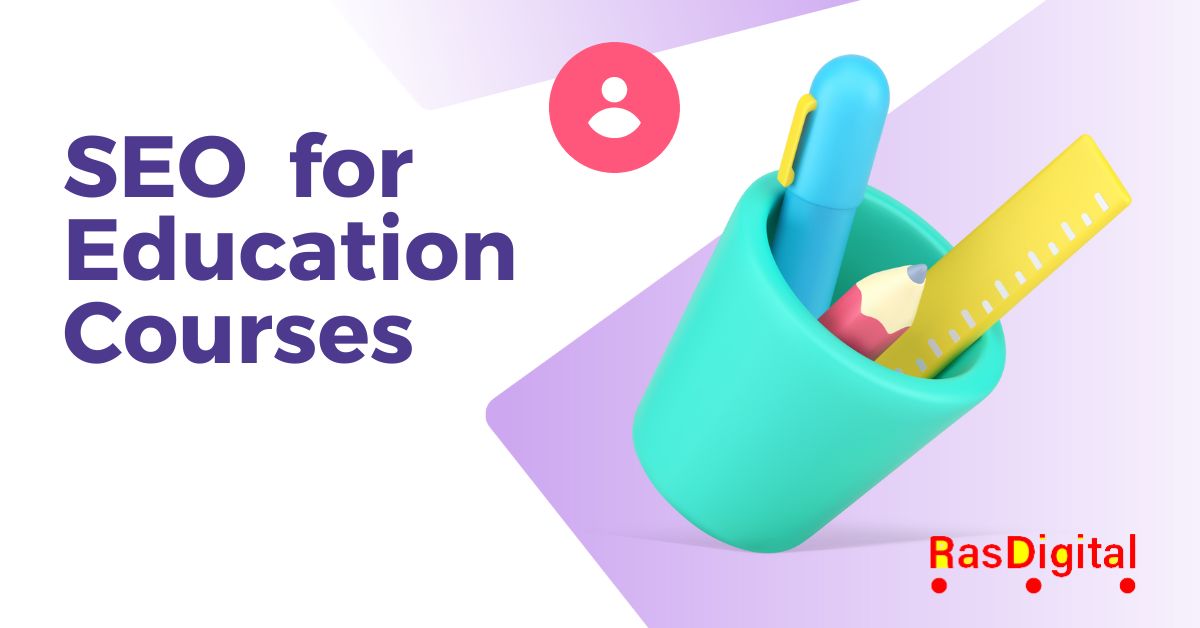In today’s digital era, establishing a strong online presence is crucial for any business or organisation, and educational institutions are no exception. With the increasing reliance on search engines, it is essential for colleges and educational organisations in the UK to implement effective Search Engine Optimisation (SEO) strategies to enhance their visibility and reach their target audience. RasDigital Agency, a leading UK-based SEO agency, is here to guide educational institutions through the intricacies of SEO and keyword optimisation for course programs.
Understanding the Basics of SEO:
SEO is the process of optimising a website to improve its visibility on search engine results pages (SERPs). For educational organisations, this means ensuring that their courses, programs, and services are easily discoverable by potential students, parents, and other stakeholders.
Keyword Research:
One of the fundamental aspects of SEO is keyword optimisation. This involves identifying and targeting the specific words and phrases that potential users are likely to use when searching for educational services. RasDigital Agency emphasise the importance of conducting thorough keyword research to uncover the terms that resonate with the target audience.
For educational organisations in the UK, it’s crucial to use UK English spellings in their content. Utilising tools like Google Keyword Planner can help identify relevant keywords and phrases that are commonly searched within the UK.
Content Creation and Optimisation:
Once the relevant keywords are identified, the next step is to create high-quality, engaging content around those keywords. This includes optimising website pages, blog posts, and other online materials to incorporate the selected keywords naturally.
RasDigital Agency advises educational organisations to create content that not only aligns with their target keywords but also provides valuable information to their audience. Google’s algorithm values content that is informative, well-written, and caters to the user’s intent.
Local SEO for Educational Organisations:
Local SEO is particularly vital for educational institutions, as they often serve specific geographic areas. RasDigital Agency recommends optimising content with location-specific keywords to improve visibility within the local community. This includes mentioning the city or region in meta tags, content, and other on-page elements.
Building High-Quality Backlinks:
Backlinks, or links from other websites to yours, play a crucial role in SEO. Educational organisations can enhance their online authority and credibility by acquiring high-quality backlinks from reputable sources. RasDigital Agency emphasise the importance of creating shareable content, reaching out to relevant influencers, and participating in industry-specific communities to build a robust backlink profile.
Technical SEO:
In addition to on-page and off-page SEO, technical SEO is equally important for ensuring a website’s optimal performance. Educational organisations must focus on factors such as website speed, mobile responsiveness, and secure HTTPS protocols. RasDigital Agency recommends regular website audits to identify and address technical issues that may impact search engine rankings.
Monitoring and Analytics:
SEO is an ongoing process, and monitoring performance is key to making informed decisions. Educational organisations should leverage analytics tools like Google Analytics to track website traffic, user behaviour, and other key metrics. RasDigital Agency suggests regularly reviewing this data to identify areas for improvement and refine SEO strategies accordingly.
International SEO for educational courses involves optimising online content to reach a global audience interested in pursuing educational programs in the UK.
Keyword Research and Localisation : Conduct thorough keyword research to identify terms relevant to your courses. Use tools like Google Keyword Planner to discover popular search terms in different languages. Localise keywords to cater to the specific language and cultural nuances of your target audience.
- Multilingual Content: Create high-quality, relevant, and engaging content in multiple languages. Translate course descriptions, landing pages, and other important content. Invest in professional translation services to ensure accuracy and cultural appropriateness. Consider regional variations in terminology and academic preferences.
- Hreflang Tags: Implement hreflang tags in the HTML code to signal search engines about the language and regional targeting of your content. This helps search engines deliver the most appropriate version of your pages to users based on their location and language preferences.
- Mobile Optimisation: Ensure that your website is mobile-friendly since many users in different regions access educational content through mobile devices. Google gives preference to mobile-optimised sites in search rankings.
- Localised SEO Meta Tags: Customise meta tags, including title tags and meta descriptions, for each language and region. Craft compelling and culturally relevant meta content to increase click-through rates in search engine results.
- Backlink Building: Develop a diverse and authoritative backlink profile from educational institutions, industry influencers, and relevant websites in your target regions. This boosts your site’s credibility and improves search engine rankings.
- Social Media Localisation : Leverage social media platforms with a global reach. Customise your social media profiles and content for different regions. Engage with local communities, share success stories, and encourage user-generated content to build a strong online presence.
- User Experience (UX): Prioritise a seamless and intuitive user experience on your website. Optimise page load times, ensure easy navigation, and offer clear calls-to-action for international users. A positive user experience contributes to better search rankings.
- Regular Audits and Analytics: Conduct regular SEO audits to identify and address issues. Use analytics tools to monitor the performance of your international SEO efforts, track user behaviour, and make data-driven decisions for continuous improvement.
By implementing these strategies, educational institutions can enhance their online visibility, attract a diverse audience, and effectively compete in the global market for educational courses.
Conclusion:
In the competitive landscape of the UK’s educational sector, effective SEO and keyword optimisation on course programs are indispensable for standing out and attracting the right audience. RasDigital Agency ‘team’, with its expertise in SEO strategies tailored to the UK or International market, is well-positioned to assist Academies, Universities and learning organisations in maximising their online visibility and achieving their goals. By implementing a comprehensive SEO strategy, educational institutions can enhance their digital presence, connect with their target audience, and ultimately thrive in the digital age.
